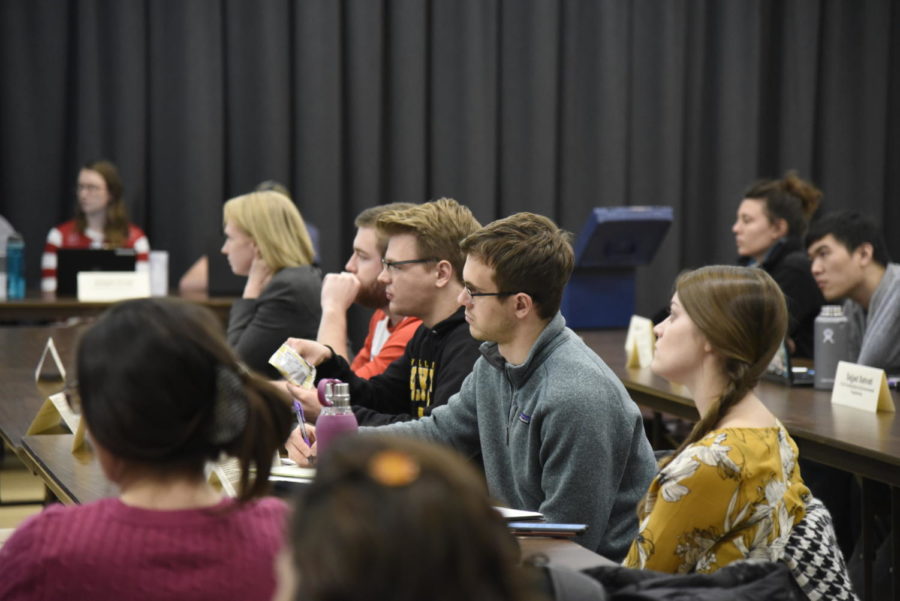Graduate and Professional Student Senate votes to censure the Office of the President
July 27, 2020
Editor’s note: The headline and the language of this article has been changed to accurately reflect the decisions during the Graduate and Professional Student Senate meeting. The Daily regrets this error.
The Graduate and Professional Student Senate (GPSS) votes to censure the Office of the President and the Office of the Provost.
“Indeed, the university’s policies regarding reopening this fall continues the trend of relegating graduate and professional students to the shadows from university and department web pages prioritizing the undergraduate experience to the claim that graduate student tuition is negligible compared to undergraduate tuition,” said Vice President James Klimavicz. “We have often been marginalized. Now, we don’t even have an on-campus Ombuds Office to talk about our potential grievances. Now more than ever it is crucial that graduate and professional students accord each other and whatever. I urge you to speak out when necessary and stand up for what is right. Talk to your departments, write letters to your legislators, organize and unionize, whatever it takes to ensure that the administration remembers that we are an integral part of it. The only way we can get through this is by standing together.”
Deanna Clingan-Fischer served as the Iowa State University ombuds officer since 2017 and will leave Iowa State on Aug. 6.
The GPSS is a significant stakeholder in the independence of the Ombuds Office, according to the documents, and was not notified nor consulted on any of the effects restructuring the Ombuds Office may have on the graduate and professional student body, and instead learned of the changes “through edits quietly and surreptitiously made to the Ombuds Office website.”
“So my understanding is that there was no reason being given,” Klimavicz said. “It used to be under the Office of the President and the way I found out [about the resignation] is by having talked to numerous parties about this. The way I found out was there is a line at the bottom of the Ombuds homepage.”
With a total of 28 votes in favor of the censure, zero against and three abstaining, the GPSS voted to condemn the changes to Iowa State University Ombuds Offices, which has existed since 2008 to provide confidential, neutral and informal guidance to graduate students, professional students, postdocs, P&S staff, merit staff and faculty.
The Ombuds Office provides tools and resources to help faculty, Professional & Scientific employees (P&S) and graduate students have crucial conversations and empower them to resolve conflicts themselves.
The office acts as a mediator, an impartial, neutral ground where students, faculty and P&S employees can come confidentially air their grievances and, if desired, take steps to make a change.
The Ombuds Office provides essential services to the graduate and professional student community through its assistance with mediation, diplomacy and problem-solving. The Ombuds Office is therefore a critical service for improving graduate and professional student wellness.
“The Ombuds Office has a duty to expose systematic issues at all levels within the university, including ongoing concerns of ‘lack of respect’ from supervisors and academic advisors toward their students and/or employees, as noted in annual reports from the Ombuds Office,” according to GPSS documents. “The Charter forming the Ombuds Office explicitly emphasizes the need for neutrality, impartiality, and independence, and these features of the Office are essential for an effective Ombuds Office.”
The Ombuds Office has reported to the Office of the President since its creation in 2008, which the Office of the President is responsible to maintain jurisdiction.
Because of this, there were rising concerns the Ombuds Office would be subject to politics of existing under an office that directly administrates a group served by the Ombuds Office — a perceived conflict of interest.
“The Ombuds Office, under the supervision of the Office of the Senior Vice President and Provost alters the perception that the office may implicitly favor faculty over graduate and professional students and postdocs, increasing the chance that students and postdocs may not receive the neutral and impartial advice that they ought to be permitted to access,” according to the GPSS documents. “Furthermore restructuring the Ombuds Office to exist under the Office of the Senior Vice President and Provost reduces the independence of the Office. The decision also results in a chilling effect on the ability of graduate and professional students and postdocs to seek the services that the Ombuds Office is intended to provide, particularly as we prepare to enter an unprecedented academic year in which many graduate and professional students will be asked to place themselves on the front lines against the novel coronavirus, teaching thousands of students across campus, any one of which may be a source of a potentially fatal infection.”







